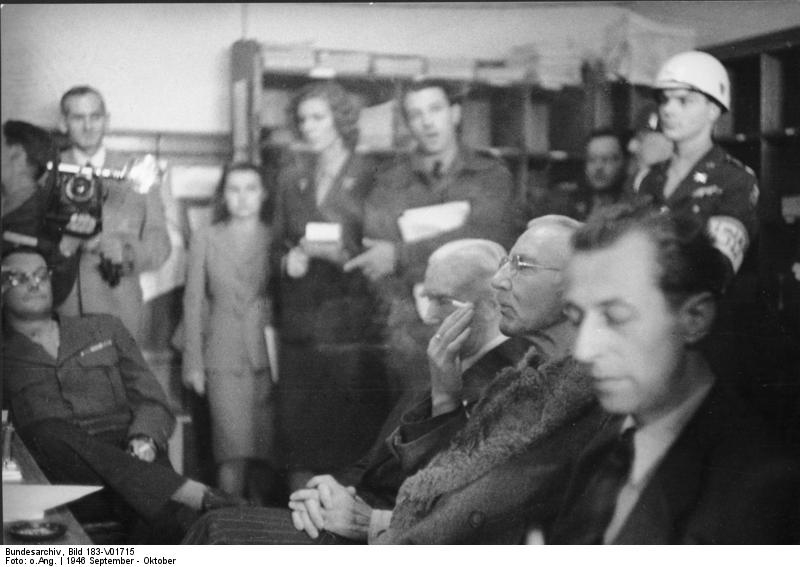Final statement Franz von Papen
THE PRESIDENT: I call upon the Defendant Franz von Papen.
FRANZ VON PAPEN (Defendant): Your Lordship, may it please the Tribunal, when I returned home in 1919, I found a people, torn by the political struggles of the parties, which was then attempting to find a new mode of existence after the downfall. In those days of my country's misfortune I beIieved, as a responsible German, that I had no right to stand inactive on the sidelines.It was clear to me that a rebirth of my country was oniy possible by way of peace and intellectual understanding, an understanding which did not deal only with political forms, but was even more concerned with the solution of the extremely urgent social problems, the first condition for bringing about internal peace.
Against the onslaught of radical ideologies it was necessary - and this was my conviction - that Christianity be maintained as the starting point of the new political order. On the issue of this internal understanding the maintenance of European peace would have to depend.
The best years of my lifework were devoted to this question, in the community, in Parliament, in the Prussian State and in the Reich. Anyone who is acquainted with the facts knows that I did not aspire to high office in 1932. Hindenburg's urgent appeal on behalf of the fatherland was a command to me. And when, like countless other Germans in the emergency of 1933, I decided to co-operate by occupying a prominent position, then I did so because I considered it to be my duty, because I believed in the possibility of steering Nationalsocialism into responsible channels and because I hoped that the maintenance of Christian principles would be the best counterweight against ideological and political radicalism and would guarantee peaceful domestic and foreign development.
That goal was not reached. The power of evil was stronger than the power of good and drove Germany inevitably into catastrophe. But should that be a reason to damn those who kept the banner of faith flying in the struggle against disbelief? And does that entitle Justice Jackson to claim that I was nothing but the hypocritical agent of a godless government? Or what gives Sir Hartley Shawcross the right to say, with scorn, ridicule, and contempt: "He preferred to reign in Hell rather than serve in Heaven''?
Gentlemen of the Prosecution, it is not for you to judge here, that is for others. But I should like to ask: Is not the question of defending transcendental values more than ever the central issue today in the efforts to rebuild a world?
I believe that I can face my responsibility with a clear conscience. Love of country and people was the only decisive factor in all my actions. I spoke without fear of man whenever I had to speak. It was not the Nazi regime but the fatherland which I served when in spite of the severest disappointments at the failure of my hopes in the field of domestic policy, I attempted, from the vantage point of my diplomatic posts, to save at least the peace.
When I examine my conscience, I do not find any guilt where the Prosecution has looked for it and claims to have found it. But where is the man without guilt and without faults? Seen from the historical point of view, this guilt may be found on that dramatic day of 2 December 1932, when I did not attempt to persuade the Reichs President with all the means at my disposal to abide by the decision he had made the night before - despite the violation of the Constitution and despite the threat by General von Schleicher ~ to start a civil war.
Does the Prosecution want to damn all those who with honest intentions offered to co-operate? Does it claim that the German people elected Hitler in 1933 because they wanted war?' Does it really claim that the overwhelming majoirity of the German people made their tremendous spiritual and material sacrifices - including even the sacrifice of their youth on the battlefields of this war - merely for Hitler's Utopian and criminal aims?
This High Tribunal faces this infinitely difficult task without yet having gained sufficient distance in time from the catastrophe, to be able to recognize the causes and results of historical developments in their true connections.
Only if this High Tribunal recognizes and acknowledges the historic truth will the historical meaning of this Tribunal be fulfilled. Only then will the German people, in spite of the destruction of its Reich, not only come to a realization of its errors, but also find the strength for its future task.
See also: Verdict Von Papen
Definitielijst
- Nazi
- Abbreviation of a national socialist.
Images
 From right to left: Hans Fritzsche, Hjalmar Schacht and Franz von Papen meet the press shortly after their acquittal by the Tribunal. Source: Bundesarchiv, Bild 183-V01715 / CC-BY-SA 3.0.
From right to left: Hans Fritzsche, Hjalmar Schacht and Franz von Papen meet the press shortly after their acquittal by the Tribunal. Source: Bundesarchiv, Bild 183-V01715 / CC-BY-SA 3.0.Information
- Published by:
- Arnold Palthe
- Published on:
- 06-01-2016
- Last edit on:
- 11-01-2019
- Feedback?
- Send it!
Sources
International Military Tribunal, Nuremberg 1947



